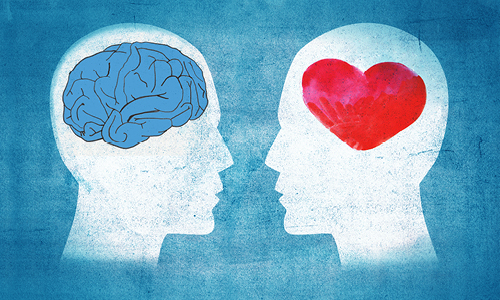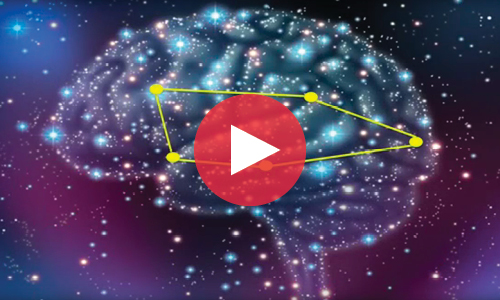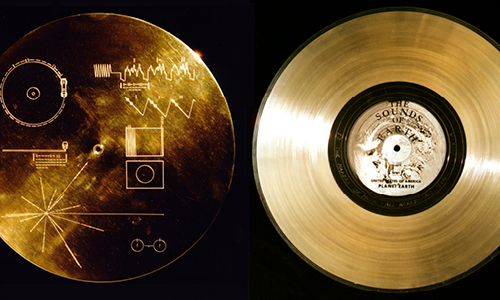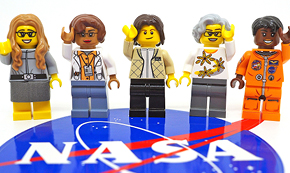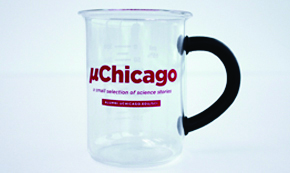|
|
|
|
|
|
| |
|
|
| |
Stephanie Cacioppo studies the physiological nature of romance. |
|
| |
|
|
|
|
|
| |
|
|
| |
It's a romance cliché: "You make me a better person." |
|
| |
|
|
|
| |
|
|
| |
Neuroscientist Stephanie Cacioppo's research suggests it might actually be true, though it's the feelings (metered paywall) more than the object of love that can make you "better." |
|
| |
|
|
|
| |
|
|
| |
The director of UChicago's Brain Dynamics Laboratory since 2012, Cacioppo made her first major breakthrough in the study of neurological love--its origins and effects--in 2007 as a postdoc at Dartmouth. |
|
| |
|
|
|
| |
|
|
| |
There she identified a "brain signature" for love using functional MRI scans to see what parts of the brain lit up when a subject looked at images and names of loved ones. Beyond determining several regions of the brain associated with romantic love, she also used this data to distinguish it from other emotions, like maternal love or general happiness. |
|
| |
|
|
|
| |
|
|
| |
Using fMRI and eye-tracking experiments, she also separated lust from love. (In a nonshocker, looking at a person's face correlated with love, while looking at a person's body tracked with lust.) |
|
| |
|
|
|
| |
|
|
| |
Cacioppo's recent work zeros in on the angular gyrus, a brain region unique to hominids and connected to creativity, abstract thought, numbers and language, and self-perception. Passionate love, she has found, gives the angular gyrus a strenuous workout, forming neural connections and improving brain function in those cognitive areas. |
|
| |
|
|
|
| |
|
|
| |
|
|
| |
| |
|
|
| |
Stephanie and John Cacioppo discuss the neuroscience of love and loneliness. |
|
| |
|
|
|
|
| |
|
|
|
| |
|
|
| |
While Cacioppo's work suggests measurable cognitive benefits to human relationships, and other studies indicate love even leads to better physical healing, the former Stephanie Ortigue was happily married to her career for a long time. Then she met a man wedded to his own work, studying the effects of loneliness (metered paywall). She and John Cacioppo, the Tiffany and Margaret Blake Distinguished Service Professor in Psychology at UChicago since 1999, married in 2011 and now share their lives, careers, and a campus office. |
|
| |
|
|
|
| |
|
|
| |
Their love story hasn't gone without its challenges. John was diagnosed with head and neck cancer in 2015 and lung cancer in 2016. With Stephanie by his side through surgery, chemo, radiation, and a conceivably healing dose of love, John has been declared effectively cured. |
|
| |
|
|
|
|
|
| |
|
|
| |
Five more ways the brain does--and doesn't--love |
|
| |
|
|
|
|
|
|
|
| |
|
|
| |
|
|
|
| Vole love--the North American species is mostly monogamous--is more than an anagram pair. It's a model for human relationships. |
|
|
|
| |
|
|
|
|
|
| |
|
|
| |
|
|
|
| Love affects the brain's reward system in much the same way drug use does. |
|
|
|
| |
|
|
|
|
|
|
|
|
|
| |
|
|
| |
|
|
|
| Acknowledging social isolation's effect on body and mind, the UK now treats loneliness as a public health issue. |
|
|
|
| |
|
|
|
|
|
|
|
|
|
| |
|
|
| |
|
|
| |
| |
|
|
| |
The Golden Record is a 12-inch gold-plated copper phonograph record with a cover engraved with instructions on how to play it. (Image courtesy NASA) |
|
| |
|
|
|
|
| |
|
|
|
| |
|
|
| |
When NASA launched Voyager 1 and 2 in 1977, the spacecraft carried the Golden Record--a sort of "cultural Noah's Ark" for intelligent alien life. |
|
| |
|
|
|
| |
|
|
| |
Astrophysicist Carl Sagan, AB'54, SB'55, SM'56, PhD'60, worked with writer and producer Ann Druyan to curate the record, which includes the sounds of Druyan's brain waves. She tried to meditate about history and culture but drifted into thoughts on falling in love with Sagan. Two days after Voyager 1 launched, the pair announced their engagement. |
|
| |
|
|
|
|
|
|
|
|
|
| |
|
|
| |
Win this mug:
Forward µChicago, and we’ll enter you in our monthly drawing.
|
| |
|
|
|
|
|
|
|
|
|
|
| |
|
|
| |
| |
|
|
| |
Good things come to those who share! Forward µChicago to a friend and be entered to win a prize. Congratulations to last month's contest winner, Sarah Rosenshine, AB'09.
Sign up to receive µChicago monthly. |
|
| |
|
|
|
|
| |
|
|
|

